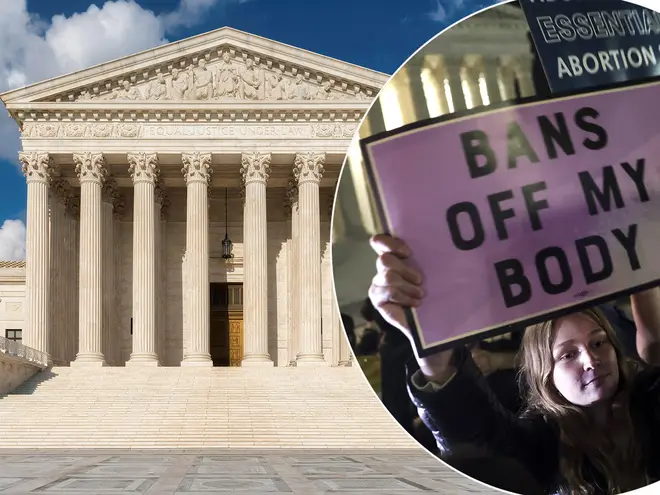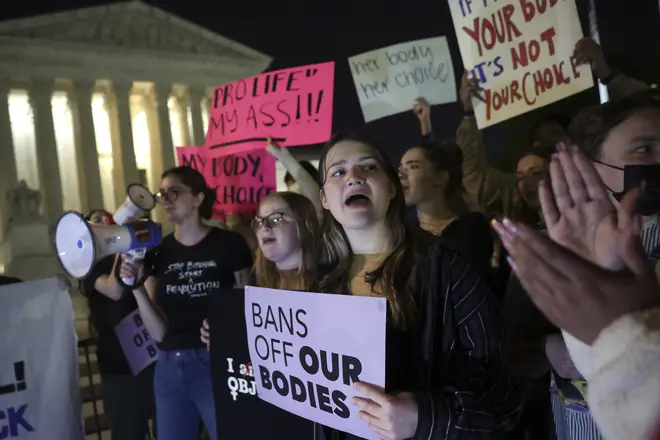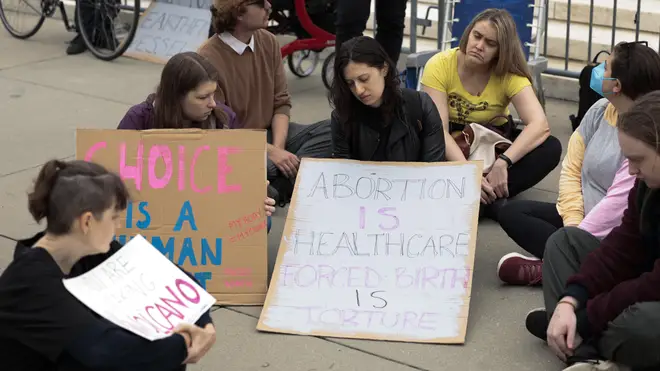
Lewis Goodall 10am - 12pm
3 May 2022, 15:01 | Updated: 3 May 2022, 15:08

The US Supreme Court could be poised to overturn the landmark case protecting women's abortions rights.
Hundreds of abortion rights protesters have gathered outside the US Supreme Court after a leaked document labelled "Opinion of the Court" showed support for overturning abortion laws in America.
The document, which may not be the court's final word, showed there was overwhelming backing to overturn the 1973 case of Roe V Wade - the law which protects abortion rights - as they believe it was "egregiously wrong".
Should the law be overturned, individual states in America would be allowed to ban abortion if they wish. So far thirteen states have passed trigger laws ready for if Roe V Wade is turned over.
Related article: 'Pills by post' home abortion scheme to be axed
Related article: Americans think UK is 'lucky to have Boris', caller tells Nick Ferrari
So what exactly is the Roe V Wade case? And why does it affect abortion rights? Here's all the details:


Rachel Johnson's take on the Texas abortion ban
Nearly 50 years ago, a case was brought to everyone's attention that the right to personal privacy under the US Constitution, should also protect a woman's right to terminate her pregnancy.
On January 22, 1973, the Supreme Court agreed and decided the constitutional right to privacy also applied to abortion - overturning Texas laws and setting a precedent in all 50 states of America.
The case, Roe V Wade, was 'Jane Roe', a pseudonym for Norma McCorvey, who was a single mum, pregnant for the third time and wanting a termination.
She sued Dallas attorney general, Henry Wade, who made abortion a crime unless in cases of rape, incest or when a mother's life was in danger.
Roe argued that she was unable to travel for an abortion and that the laws were too vague and infringed on her constitutional right to privacy.
At the same time, a Texas doctor was also questioning the vagueness of the law as he was unable to reliably identify which patients would have the right for an abortion.
A third complaint came in the form of 'Does', a childless couple who wanted the right for an abortion should she ever fall pregnant as the medical risks made it unsafe for her to fall pregnant, but not life threatening.
All three complaints made it to the top court which led to the historic seven-to-two decision to allow women the right to an abortion.

The US Supreme Court could be getting ready to overturn the ruling after a leaked document was published on political news organisation Politico. Neither the Supreme Court or the White House have commented on the claims yet.
It comes as a case comes to court challenging Mississippi's ban on abortion after 15 weeks - a case known as Dobbs v Jackson Women's Health Organisation.
The leaked document shows the majority of the court wish to overturn the Roe V Wade legislation as they deem it "egregiously wrong".
"Roe was egregiously wrong from the start," the draft opinion states.
"We hold that Roe and Casey must be overruled," it adds, referencing the 1992 case Planned Parenthood v Casey that affirmed Roe's finding of a constitutional right to abortion services but allowed states to place some constraints on the practice.
"It is time to heed the Constitution and return the issue of abortion to the people's elected representatives."
The draft opinion in effect states there is no constitutional right to abortion services and would allow individual states to more heavily regulate or outright ban the procedure.
If the law was overturned, individual states will decide whether abortions are illegal or not. It is expected at least half of the US states would make it illegal.